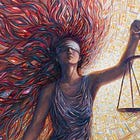Bruce Pardy: Law, Liberty, and the Battle for a New Nation
Envisioning a path to genuine freedom amid Canada's failing political and legal structures
This is part three of three of my interview with law professor Bruce Pardy. In this important conversation, he dissects Canada's medical authoritarianism and property illusions, while offering insights on how Alberta can forge a freer future. From the abuse of healthcare professionals during the COVID-19 crisis to the erosion of private property through Crown ownership and Aboriginal title conflicts, Canada's legal and political systems no longer serve the public.
Bruce Pardy is a professor of law at Queen’s University and Executive Director of Rights Probe, a legal advocacy organization focused on individual liberty and the rule of law. His writing explores foundational legal and philosophical questions surrounding classical liberalism, individual autonomy, the growth of the managerial state, and the clash between individualism and collectivism.
To explore Bruce Pardy’s insightful legal and philosophical commentary, you can follow his work at:
Substack: brucepardy
X: @pardybruce
Website: rightsprobe
Healthcare: a Litmus Test for Freedom
Pardy argues that Alberta’s existing healthcare system contains a legacy of centralized control. The single-payer model not only extracts taxes to fund a government monopoly but also makes it harder for citizens to decide what is best for them. During the COVID-19 crisis, this monopoly enforced unprecedented mandates, pressuring doctors and nurses to comply or face termination. Many complied under duress, but a few resisted—at great personal cost. Pardy says that any future healthcare system that claims to serve a free Alberta must reject this coercive legacy.
In this spirit, it is clear that the people best suited to guide Alberta are those who upheld medical ethics under pressure, not those who enforced experimental “vaccine” mandates. Choosing the right leadership will signal whether Alberta intends to be truly free, or merely repeat the failures of the past under a new flag.
The Illusion of Property Ownership
Canadians often believe they own their land, but there are many complications which undermine this feeling of security. Pardy explains how, under current law, the government can take private property through expropriation, as there are no constitutional guarantees to stop it. Complicating matters further, Aboriginal title—recognized in section 35 of the Constitution—can supersede conventional ownership, leaving residents even more uncertain about their rights.
In provinces like British Columbia, agreements that return vast territories to Aboriginal governance have created legal ambiguity. Property owners are left unsure whether their titles still hold, while the land remains effectively under the control of government agencies or appointed bodies. True ownership requires clarity, autonomy, and legal security—none of which currently exist under the Canadian framework.
Breaking from Away From Systems of Control
Canada’s institutions have become dominated by a self-perpetuating managerial group: bureaucrats, health officials, media figures, and legal operatives who are largely unaccountable to the public. These figures do not merely mismanage—they actively suppress dissent and concentrate power. This was visible during the COVID-19 response, where truth was hidden and those who spoke it were silenced.
Pardy encourages Alberta to consciously reject this structure as it looks towards independence. It must build governance that is transparent, decentralized, and rooted in voluntary consent. This will not be easy. Political struggle is inevitable. But without structural change, any movement for independence risks being captured by the same forces it seeks to escape.
Rebuilding From the Foundations
Alberta stands at a turning point. What lies ahead is more than political conflict—it’s an opportunity to shape a new social contract founded on truth, freedom, and responsibility. Though the path will be messy and uncertain, it offers something rare in history: a blank page. What is written on it must be intentional and aimed at maximizing human flourishing.
Related Material
Bruce Pardy’s recent article titled: A Declaration of Independence for Alberta (Read Here)






Oh Canada,
Did you see it on TV?
The only thing to save us now...
Is rolling up your sleeve.
Oh Canada,
I saw it on the screen
They had the cure for covid
But you weren't allowed to see.
Good People of Canada we are counting on you to do things better than the Criminal Corrupt Cabal called the U$@, Inc As a wonderful country to rise above what the failed UK $situation GOD Bless the Canadian Truckers who Stood Up Spoke Out You are not Forgotten Shameful other Canadians were not there for you and those that were also paid a high price for their support of Humanity above Evil that is